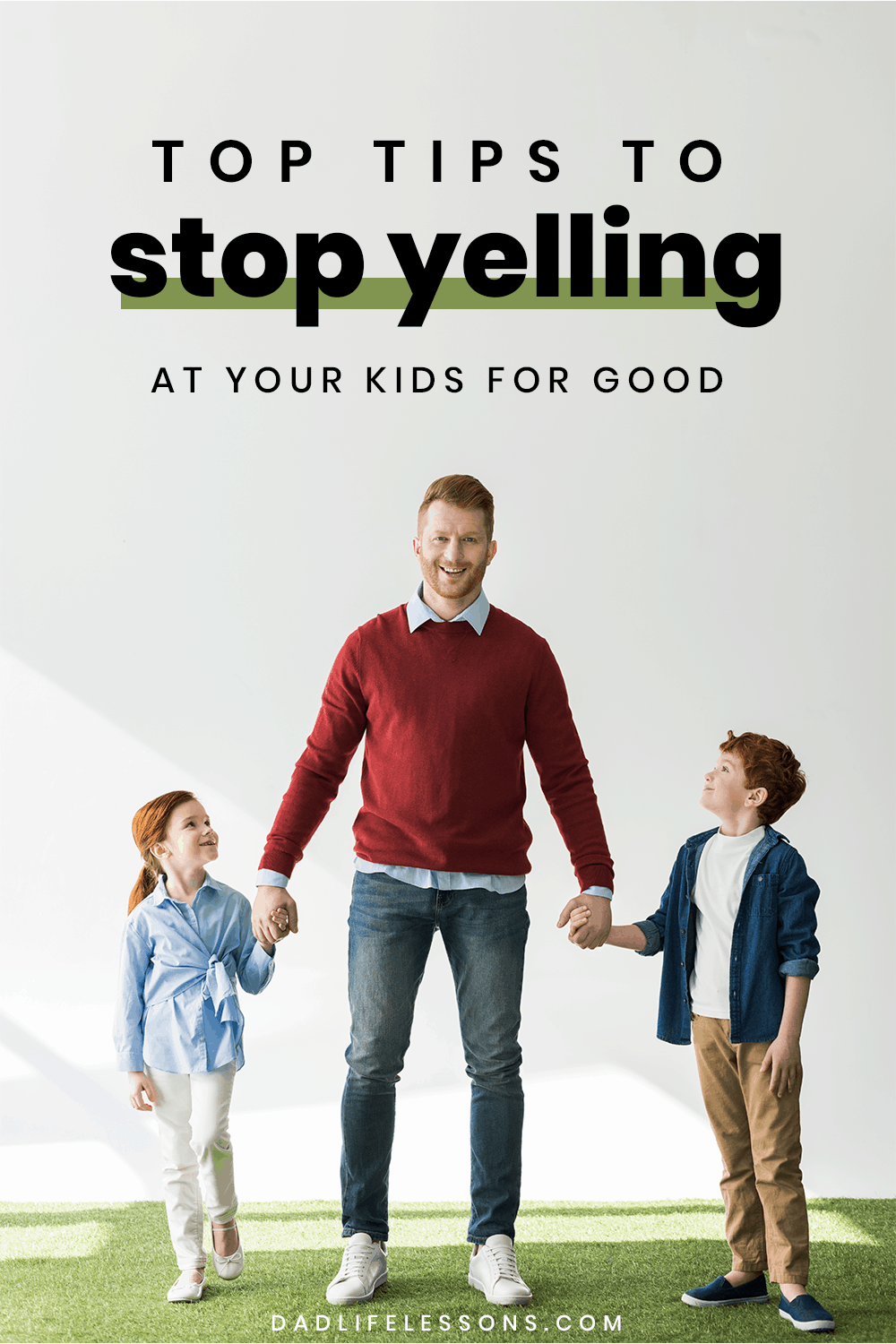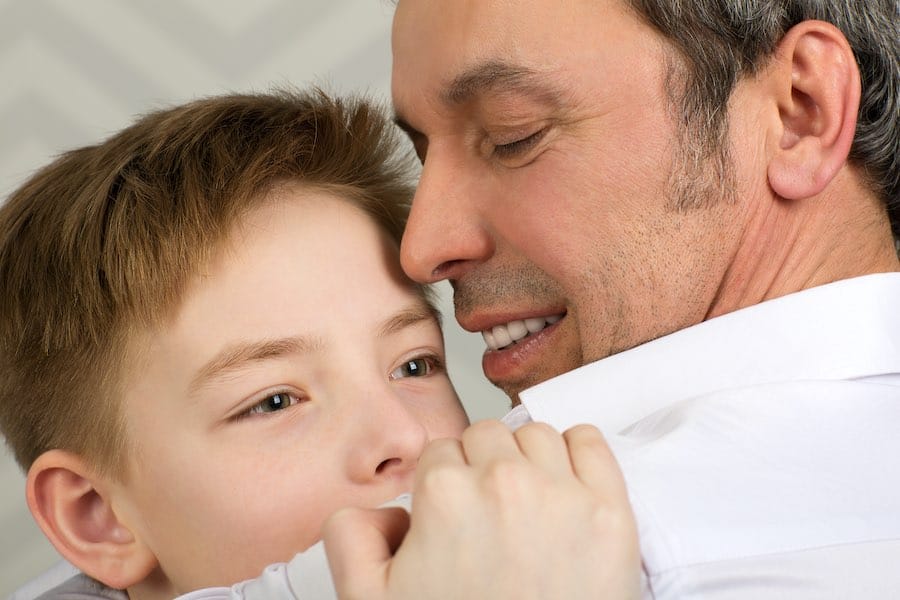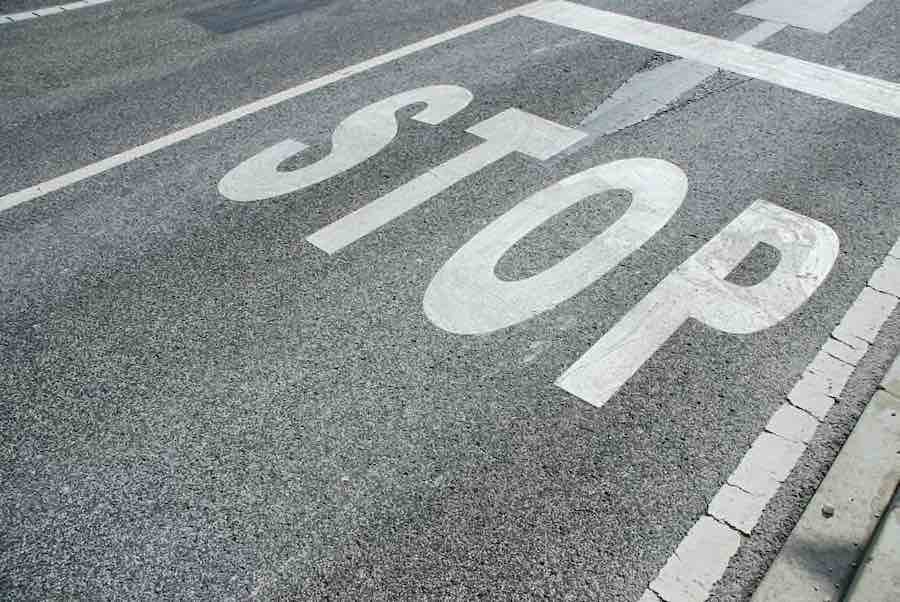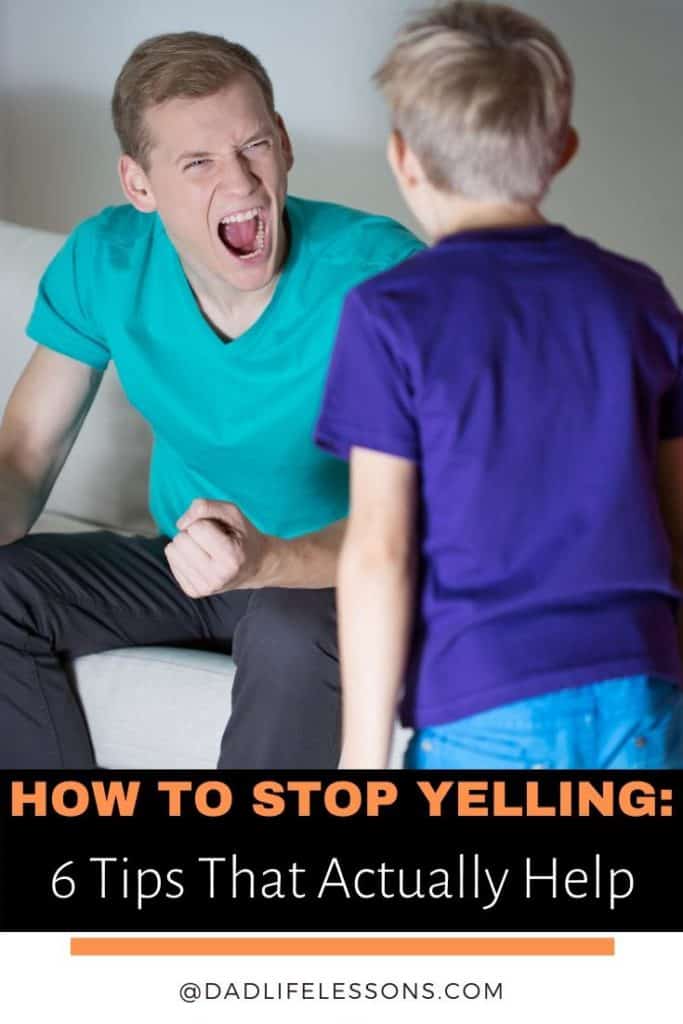What happens when you yell at your kids? You’re fed up, tired of not being taken seriously, and that’s when you pull out that weapon only dads have: the dreaded dad voice. It’s big, it’s deep, and it’s scary. But that doesn’t mean you can’t. Learn How To Stop Yelling With These 6 Tips That Actually Help. It will just take some work.

“Did you not hear me? I said stop it!”, you yell right before your child stops and starts crying. You’re frustrated and angry so you continue to scold them. “I’m so sick of you ignoring me like that! Why can’t you just listen? I told you to stop so you need to stop! Do you understand me?”
Then the guilt and regret settle in. Your child is now sobbing and you start beating yourself up and wonder how you will ever stop yelling at your kids. None of us like to yell at our kids. We want to stop yelling. We just don’t know how to actually do it!
So how do you stop yelling at your kids for good?
Before I get to that, I want to break down how these scenarios really affect our kids. Having these facts can help put things into perspective.

How yelling affects kids
Yelling at kids can and does have lasting effects. They won’t appear immediately but over time you’ll notice a few things. The most obvious one is that yelling at your kids scares them. When you pull out that dad voice paired with scolding or lecturing – they straighten up because of fear. One of their first thoughts is what will come next if they don’t stop, so of course they stop what they ’re doing. It is almost an entirely fear-based response.
The behavior is learned
Overtime, you’ll also notice they start to learn the behavior. They model what they see, so of course this happens. They’ll yell back at you, yell at you when they are angry, or even yell at their siblings. Suddenly their response to anger becomes yelling.
It eventually gets out of control
If you don’t get a handle on it and learn to stop yelling when they start mimicking your behavior… it can get out of control. They may become more aggressive towards family and friends. They’ll be playing nicely one minute and the next, you’re ripping them off their little brother over a very small inconvenience. Or worse… you get a phone call from another parent because your child has become a bully. Things have gotten out of control and now you have to do some serious damage control so they don’t end up as the next Ted Bundy (a little extreme, but just stay with me).
So how do you stop all that from happening?

6 Tips That Actually Help You To Stop Yelling
To stop your child from getting aggressive and out of control, you need to get a handle on your own anger and stop yelling at your kids.
Identify your triggers
First things first – identify what your triggers are. There’s something that makes us all yell eventually. Even those dads who have mastered not yelling.
Think back to the last time you yelled:
- Were your boys roughhousing too loud?
- Did your daughter get too much sass with you when you asked her to do something?
- Or maybe all your kids did a team effort in choosing to ignore you?
Once you identify what triggers you, you can figure out exactly what you need to do in order to manage those triggers and stop yelling.
Manage your expectations
The next part of this is to manage your expectations with your kids. Oftentimes, we yell because we ourselves have run out of patience. But sometimes, our child hasn’t even done anything wrong. They are simply not advanced enough to act the way we want them to. Maybe they have no impulse control yet, they don’t have great listening skills, or they have too much energy bottled up that is causing them to act a little crazy.
If you’re not sure if you have appropriate expectations, check out this full age by age guide on expectations.

Take timeout for yourself
When our kids get out of control, we put them into timeout. What about us? Well, we can take a timeout too. If you feel like you’re going to explode any moment, take a minute to go cool off. Remove yourself from the situation and take your own timeout. Recollect and return once you’ve had a chance to cool off. This one really helps me personally.
If you have children that are too small to be left alone and you’re caring for them by yourself… find pockets of time that you can take some time to yourself. Maybe it’s a few minutes in the bathroom, time in the car in-between activities, or when you have help with the kids. And if it’s your thing, try meditation! You’d be surprised what kind of effects it can have on you.
Manage your emotions
While it’s great to manage our anger and frustration in the moment, managing those emotions on the day-to-day is important too. We can’t possibly teach our kids to manage anger, be kind, etc if we ourselves are not demonstrating the behavior. And if we don’t yet possess those skills for whatever reason, this great motivation to learn it.
Here’s how to manage your own emotions:
- Feel the emotion and don’t try to dispose of it
- Identify what emotion you’re feeling
- Wait and see what happens next before taking action
- Stop, breathe, and assess
- Express your feelings to others
It does take work before this becomes a habit. But, you’re rewiring your brain and it will eventually become second nature to you. As you are able to control your own emotions, your child will notice and will mimic that behavior. They will learn not to let their emotions control them as they get older after watching you do it! This will help them so much as they become dads to their own kids. Before you know it, you will have stopped yelling at your kids.
Teach lessons later
As tempting as it is, don’t try to teach a lesson while you’re full of anger and frustration. You can’t think clearly and your child very well might be in that exact same frame of mind. Rather, wait until you’re calm and ready to talk. It’s hard to approach your child without scolding them while you’re still full of anger and frustration.
When you’re calm, your child will be more receptive to what you’re trying to teach them, too. They’ll feel safe and know they can trust you. The best part – those lessons will actually stick instead of running in circles all the time!

Be aware of the warning signs
When you become more aware, you’ll also notice warning signs before you want to yell. Pay attention and get your emotions under control before you want to blow steam. It is also helpful to rate your anger throughout the day. Amanda from Messy Motherhood created an anger scale that states this:
- 1 means we are feeling great, happy, and relaxed
- 2 means we are relaxed, but a bit annoyed
- 3 means we are starting to feel tense
- 4 means we are yelling and angry
- 5 means we are full blown screaming
It’s best to be aware and notice when you start creeping up towards a 3 before it gets out of control. This awareness is critical to avoid yelling at your kids.
Discipline without yelling
You understand how to stop yelling at your kids, so how do you discipline without it? The simple answer is you love your child while setting those boundaries.
Connect with your child
The first part to this is to connect with one another. A child who feels connected to their dad is one who is more willing to listen when we’re ready to teach them.

A few ways to connect before teaching the lesson:
- Acknowledge their feelings and offer a hug or to read a book
- Play and get them laughing really hard
- Give them undivided attention
Set firm boundaries
Once you’ve connected with your child, now it’s time to set those boundaries and teach the lesson! Just because you’re waiting until you’re calm doesn’t mean you aren’t making it clear what the rules are and what’s acceptable.
You can do this by:
- Pointing out the cost of your child’s actions
- Ask them what they can do to fix the situation
By taking this approach, your child can identify themselves what they did, what happened, and how to fix it. Since you’re calm while doing so, they will more likely listen and understand.
When we yell at our kids, it can scare them, cause them to start yelling, and even become mean and aggressive if it gets more out of control.
If you want to stop yelling, these 6 tips actually help:
- Identify your triggers and how to manage them
- Make sure you have realistic expectations
- Take a timeout as needed
- Manage your own emotions
- Teach the lessons later so they’re more receptive
- Be aware of any warning signs that you’re getting angry
When it is time to teach a lesson, connect with your child first before setting the boundary. This ensures they listen and accept the lesson you’re trying to teach them. When you want to stop yelling, it isn’t easy. But it can be done and you can still discipline without it!
Put the dad voice away and before you know it, you’ll be able to stay you have stopped yelling for good.

If you loved these Stop Yelling: 6 Tips That Actually Help, sure to pin this to your favorite parenting board on Pinterest so you can find it again. Post a photo of your family and tag us social media @DadLifeLessons. We love helping people be the best parents they can be!
Leave a Reply